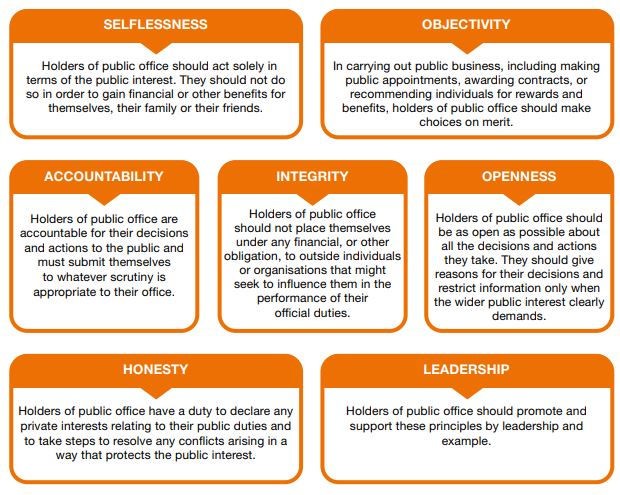Governance Overview
University of Lincoln Academy Trust (UoLAT) has clear tiers of governance which conforms to the Academy trust handbook along with the most recent guidance from the Regional Director. There is clear separation of personnel between the three tiers of governance, with only the Chair of the Trust and CEO bridging any tier; the Chair is a Member and Trustee, the CEO is also a Trustee. This means each committee can be held to account for their decisions, without conflict of interest, whilst also providing good communication between the various tiers.
-
Members (Sponsor)
-
Trustees (Directors) – Board of Trustees
-
Governors – Academy Governing Committee (AGC)

Nolan Principles
The conduct of the Trust's business at all levels is critical to the reputation of the Trust and its sponsors. Trustees, governors and executive staff must declare any real or perceived interests that arise as part of their work. If they have any doubts they must consult the CEO/Accounting Officer for advice before taking part in any discussion on a potential related matter. The golden rule is one of declaring an interest if in doubt. The Trust expects everyone to not only adhere to Nolan’s Principles of Public Life, avoiding real but also perceived conflicts of interest with any connected party relationships. 
Academy Trust Governance Code
On 7 March 2024 the Department for Education (DfE) launched a new voluntary code for Academy Trust Governance; the Academy Trust Governance Code 2024.
The Code was developed by a steering group on behalf of the academy trust sector, which included; National Governance Association, Chartered Governance Institute, Confederation of School Trusts and Stone King LLP Solicitors.
Keen to show their commitment to ensuring good governance, Trustees agreed to adopt the new Code in May 2024.
The code consists of a ‘Fundamental’ Principle, along with seven further principles.
Fundamental Principle
Committed to the Academy Trust’s charitable Objects and are determined to deliver the Academy Trust’s purpose and aims; Understand their roles and legal responsibilities, and have read and understood the Articles of Association, the Academy Trust’s governance documents, DfE guidance and, in the context of Voluntary Academies, guidance from the Academy’s relevant Foundation; and Committed to effective governance and contributing to the Academy Trust’s continued improvement.
Seven Principles
Delivering the academy trust charitable objects
The Academy Trust’s Articles of Association sets out the Academy Trust’s charitable Objects and how those must be fulfilled. The Board is clear about its aims and ensures that they are being delivered effectively and sustainably.
Leadership
The Academy Trust is led by an effective Board that provides strategic governance in line with the aims and values of the Academy Trust and engages effectively with its Members.
Integrity
The Board acts with integrity, adopting values and creating a culture which helps achieve the Academy Trust’s charitable Objects. The Board is aware of the importance of public confidence and trust in Academy Trusts and their Schools, and the Board undertakes its duties accordingly.
Decision making, risk and control
The Board ensures that its decision-making processes are evidence informed, rigorous and timely and that effective delegation, control, risk assessment and management systems are set up and monitored. There is effective reporting at all levels of Academy Trust governance to ensure decisions are taken at the correct level in accordance with the Articles of Association and Scheme of Delegation.
Board effectiveness
The Board works as an effective team, using the appropriate balance of knowledge, skills, experience, and backgrounds to make informed decisions.
Equality, diversity and inclusion
In ensuring the effective achievement of the Academy Trust’s charitable Objects, the Board has a clear, agreed and effective approach to advancing equality, diversity and inclusion throughout the Academy Trust.
Openness and accountability
The Board leads the Academy Trust in being transparent and accountable. The Academy Trust is open in its work, unless there is good reason for it not to be



